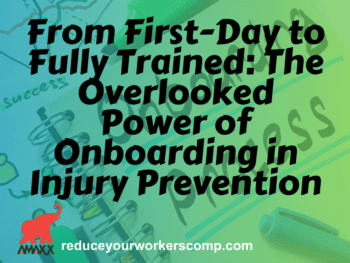As productive members of your workforce, employees must participate in your Workers’ Compensation Claims Management Program. An important factor that correlates strongly with the employer’s ability to control workers compensation costs is the ability to communicate effectively with employees.
Here are some things you might want to require that will often make a difference in the final outcome of the workers comp claim.
• Accidents must be reported immediately after an injury. Employees should be encouraged to openly communicate with their supervisors and tell them immediately if there is even a potential for a strain to develop into a workers comp injury. Every personal injury lawyer knows that soft tissue injuries may not develop fully until weeks after the injury. Conditions that are treated immediately may be halted from developing into a full blown workers comp injury that can take an employee out of work.
• Injured employees must bring your injury treatment form to the doctor who treats them. They must get this form updated at intervals you request (e.g. every two weeks). Make sure that you give both the employee and the treating physician sufficient copies of the form so that this simple step is done without excuses.
• Have their doctor fax this form to the workplace within 24 hours of each appointment. Make sure your fax number is clearly visible on the form. If you don’t receive the form, call the employee and the doctor to make sure this gets done. The longer the doctor takes to fill out the form, the less details you are likely to get, as the appointment won’t be as fresh in the doctor’s mind. Make sure you have the doctor’s full name and phone number.
• They must attend weekly status meetings at the workplace (unless they are medically unable) until they are back to work in their original job at full capacity. If they are bedridden a nurse case manager can make a home visit, if approved by your legal counsel. Give the nurse case manager a questionnaire to immediately complete and return to you.
• Be available for medical appointments and company meetings during normal business hours. If not, you need to find out the reason
• Provide updates about their medical condition. Ask for details, don’t just accept that they are “feeling the same.”
• Participate in the transitional duty program as required by policy. Have a written transitional/modified duty program ready for employees who can return to work with restrictions so that employees will know what is required of them.
• Comply with all program policies. Make sure all of your policies are in writing and are easily available for the injured employee to access. The policies should be in the employee handbooks distributed to all employees, covered at safety meetings and redistributed to the employee after an injury.
• Sign an acknowledgement form stating they have been informed of and understand all requirements.
©Amaxx Risk Solutions, Inc. All rights reserved under International Copyright Law.



























